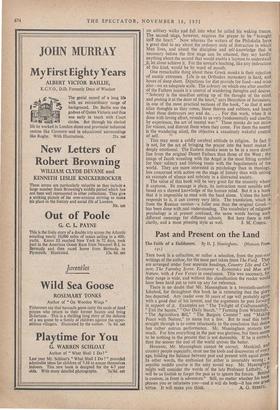Past and Present on the Land
THIS book is a collection, or rather a selection, from the post-war, writings of the author, for the most part taken from The Field. They are arranged under four separate headings, Country Life and Cul- ture, The Farming Scene, Economy v. Economics and Man and Nature, with A Few Verses in conclusion. This was necessary, fer. their range is wide, and without this classification the reader would' have been hard put to turn up any for reference. There is no doubt that Mr. Massingham is a twentieth-centurY Ichabod, for throughout this book he is reiterating that the glorY has departed. Any reader over 50 years of age will probably agree with a good deal of his lament, and the arguments he puts forward in support of it. Examples are "The Twilight of Craftsmanship, "Exit the Squire," "Our Daily Starch," "Farming from Whitehall,' "The Agriculture Bill," "The Bargain Counter" and "Maki Peace with Nature," to name but a few. But to read this book straight through is to come reluctantly to the conclusion that desire has rather outrun performance. Mr. Massingham protests to° much. For him everything in the past was glorious, but there seen" to be nothing in the present that is not damnable. If he is correct• then the sooner the end of the world arrives the better.
However, Mr. Massingham cannot be correct. Mankind, an country people especially, must use the tools and discoveries of everY age, holding the balance between past and present with equal lsois°' In other words, the enthusiast for either is invariably wrong ; 3 sensible middle course is the only sound way. Mr. MassingiVrt might well consider the words of the late Professor Lethabsr, will be as foolish to forget the past as to ignore the future. BehicT is custom, in front is adventure." Still, no matter whether his books pleases you or infuriates you—and it will do both—it ha 's one gr° virtue. It will make you think. A. G. STREET.














































































 Previous page
Previous page